Blog
Chicken & Egg Pictures to be honored at 2015 Margaret Mead Film Festival
We are pleased to announce that Chicken & Egg Pictures is being honored by the Margaret Mead Film Festival. The awards presentation will take place on Sunday October 25th, at their Filmmaker Award Ceremony at 7pm in New York.
Entrance is guaranteed for ticket holders with a stub from that day; we encourage you to join us for a double feature! Chicken & Egg Pictures grantee film Driving With Selvi is screening that day at 3pm, followed by How to Dance in Ohio at 5pm, directed by our advisory board member Alexandra Shiva.
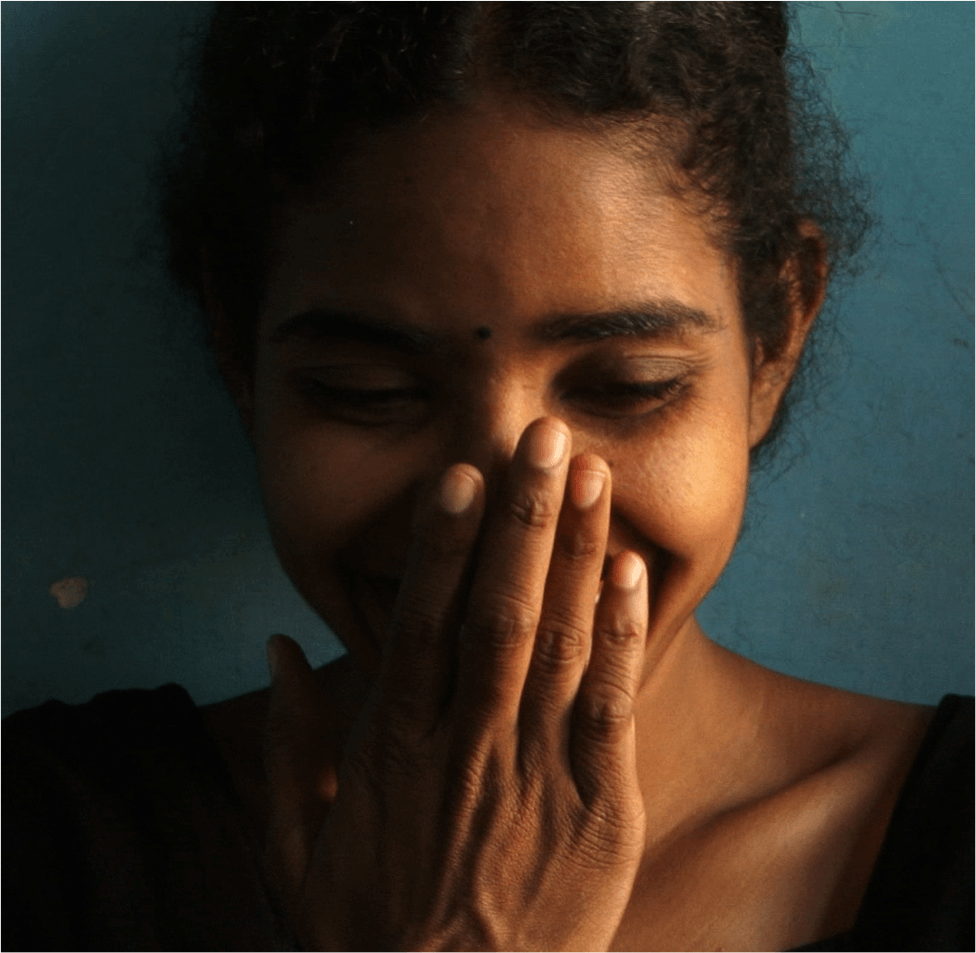
A full schedule is available here.
Join the Party! Chicken & Egg Pictures celebrates ten years on 10/22
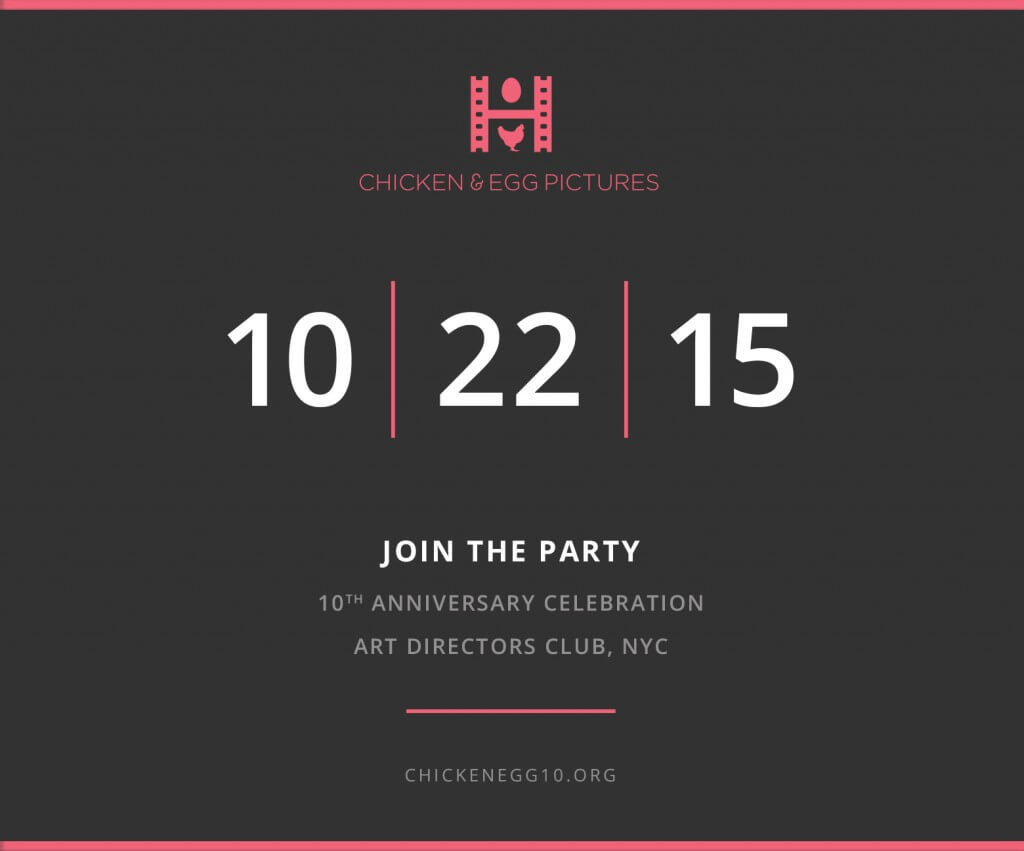
Save the Date to celebrate ten years of the Nest!
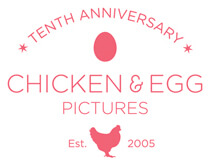 Chicken & Egg Pictures is turning ten! Join us for our 10th Anniversary Celebration on Thursday, October 22 at the Art Directors Club in New York City.
Chicken & Egg Pictures is turning ten! Join us for our 10th Anniversary Celebration on Thursday, October 22 at the Art Directors Club in New York City.
The evening will feature the launch of an interactive installation that will bring to life five Chicken & Egg Pictures grantee films.
Tickets go on sale soon, and proceeds will benefit Chicken & Egg Pictures’ programs in support of remarkable women storytellers.
Visit www.chickenegg10.org for ticket information and event details.
Chicken & Egg Pictures grantees receive Emmy nominations
Five Chicken & Egg Pictures grantees have received nominations for Emmy Awards.
Dangerous Acts Starring the Unstable Elements of Belarus (HBO), directed by Madeleine Sackler, was nominated for Outstanding Arts & Culture Programming.

After Tiller (POV), directed by Martha Shane and Lana Wilson, was nominated for Best Documentary and Outstanding Coverage of a Current News Story- Long Form. After Tiller is one of eight independent documentaries that make up Chicken & Egg Pictures’ Reel Reproductive Justice cohort.
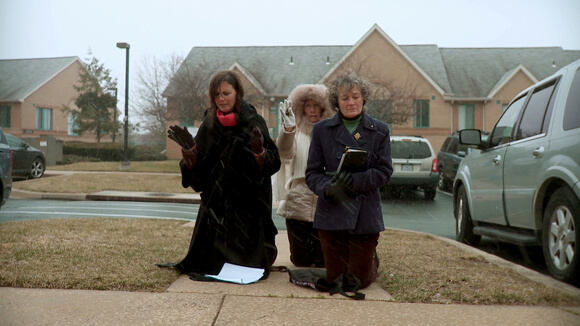
Private Violence (HBO), directed by Cynthia Hill, received a nod for Outstanding Informational Programming- Long Form. Chicken & Egg Pictures executive produced Private Violence.
Hot Girls Wanted, directed by Jill Bauer and Ronna Gradus, and The Great Invisible, directed by Margaret Brown, were both recognized with Emmy nominations for Exceptional Merit in Documentary Filmmaking.

The 67th Primetime Emmy Awards will air on Sunday, September 20. The 36th News & Documentary Emmy Awards will follow on Monday, September 28th.
The Nest on the 2015 Summer Film Festival Circuit
Summer is here and that means it’s summer film festival season. We are excited to announce that 12 Chicken & Egg Pictures-supported films will be shown at 5 Film Festivals in New York, Los Angeles, Washington DC and Sheffield this summer. Congratulations to all of our grantees!
Sheffield Doc/Fest (Sheffield, UK)
June 5-10, 2015
Democrats (Camilla Nielsson)
In the wake of Robert Mugabe’s highly criticized 2008 presidential win, a constitutional committee was created in an effort to transition Zimbabwe away from authoritarian leadership. With unprecedented access to the two political rivals overseeing the committee, this riveting firsthand account of a country’s fraught first step towards democracy plays at once like an intimate political thriller and unlikely buddy film. Click here for showtimes.
Dreamcatcher (Kim Longinotto)
Dreamcatcher is a vivid portrait of Brenda Myers-Powell, a former prostitute, who helps women and young girls break the cycle of sexual abuse and exploitation. The film lays bare the hidden violence that devastates the lives of young women, their families, and the communities where they live. It is Brenda’s unflinching intervention that turns these desperate lives around. Click here for showtimes.
Speed Sisters (Amber Fares)
Despite restrictions on movement, a motor racing scene has emerged in the West Bank. The races offer a release from the pressures and uncertainties of life under military occupation. Brought together by a common desire to live life on their own terms, five determined women have joined the ranks of dozens of male drivers — competing against each other for the title, for bragging rights, for their hometown, and to prove that women can compete head-on with the guys. Speed Sisters captures the drive to defy all odds, leaving in its trail shattered stereotypes about gender and the Arab world. Click here for showtimes.
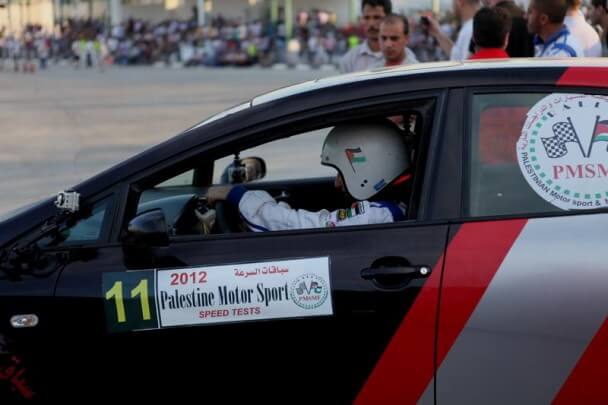
Los Angeles Film Festival (Los Angeles, CA)
June 10-18, 2015
The Babushkas of Chernobyl (Anne Bogart & Holly Morris)
In the radioactive Dead Zone of Chernobyl, a community of elderly Ukrainian women is defiantly clinging to their ancestral homeland. While most of their neighbors have long since fled, this sisterhood is hanging on — thriving, even — while cultivating an existence on some of the world’s most toxic land. Why Hanna, Maria, and Valentyna chose to live here after the disaster, in defiance of authority, is a tale about the pull of home and the healing power of shaping one’s destiny. Click here for showtimes.
Catching The Sun (Shalini Kantayya)
Catching the Sun asks the hard questions of how a clean energy economy may actually be built, through the stories of unemployed workers seeking to retool at a solar jobs training program in Richmond, California. The film tells the story of environmental transformation from the perspective of workers who may build a solution with their own hands, and their challenges speak to one of the biggest questions of our time: Will America be able to build a clean energy economy? Click here for showtimes.
No Más Bebés (Renee Tajima-Peña)
They came to have their babies. They left sterilized. The story of immigrant mothers who sued county doctors, the state, and the U.S. government after they were prodded into sterilizations while giving birth at the Los Angeles County-USC Medical Center during the 1960s and 70s. Led by an intrepid, 26-year-old Chicana lawyer and armed with hospital records secretly gathered by a whistle-blowing young doctor, the mothers faced public exposure and stood up to powerful institutions in the name of justice. Click here for showtimes.

Human Rights Watch Film Festival (New York, NY)
June 12-20, 2015
(T)ERROR (Lyric R. Cabral & David Felix Sutcliffe)
(T)ERROR is the first documentary to place filmmakers on the ground during an active FBI counterterrorism sting operation. Through the perspective of “Shariff”, a 63-year-old Black revolutionary turned informant, viewers get an unfettered glimpse of the government’s counterterrorism tactics and the murky justifications behind them. Taut, stark and controversial, (T)ERROR illuminates the fragile relationships between individual and surveillance state in modern America, and asks who is watching the watchers. Click here for showtimes.
The Trials of Spring (Gini Reticker)
The Trials of Spring follows the journeys of three Egyptian women from the early days of the 2011 Arab Spring until today: Hend, from a rural military family, awaiting a harsh prison sentence for protesting against military rule; Miriam, an activist fighting to end sexual assault; and Mama Khadiga, a formerly veiled widow who became a caretaker of the revolutionaries. Their intersecting stories reveal the vital and underreported role women play in shaping the region’s future. Click here for showtimes.
What Tomorrow Brings (Beth Murphy)
Special work-in-progress screening
What Tomorrow Brings is a coming-of-age story in which Afghan girls studying at the Zabuli School struggle against tradition and time. They discover that their school is the one place they can turn to understand the differences between the lives they were born into and the lives they dream of leading. At a time when the political and security situation is rapidly changing, the film weaves the interconnected stories of students, teachers, parents, and school founder Razia Jan. Click here for showtimes.
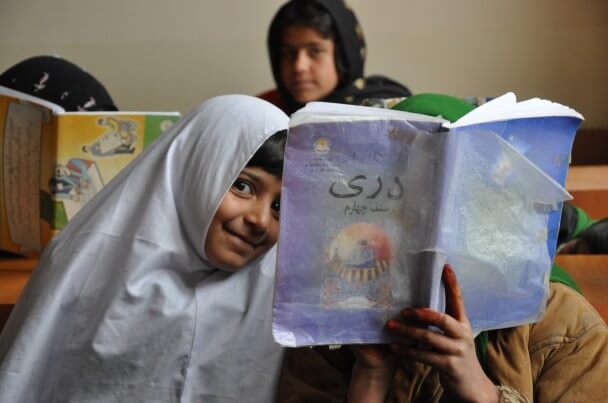
AFI Docs (Washington, DC & Silver Spring, MD)
June 17-21, 2015
Among The Believers (Hemal Trivedi & Mohammed Ali Naqvi)
A Pakistani radical cleric, Aziz declares a war against the government to impose Islamic utopia in the country. The government retaliates by destroying his seminary and killing 150 students. The film charts the coming-of-age stories of his students, representing the hard circumstances both extremism and poverty pose for many young Pakistanis. Talha, 12, dreams of becoming a jihadi preacher. Zarina, also 12, escapes the madrassa and joins a secular school, but her poverty forces her to drop out. Click here for showtimes.
From This Day Forward (Sharon Shattuck)
When filmmaker Sharon Shattuck’s came out as transgender and changed her name to Trisha, Sharon was in the awkward throes of middle school. Her father’s transition was difficult for her straight-identified mother to accept, but they decided not to divorce. Committed to staying together as a family, they began a balancing act that would prove even more challenging than expected. As the family reunites to plan Sharon’s wedding, she asks how her parents’ love survived against all odds. Click here for showtimes.
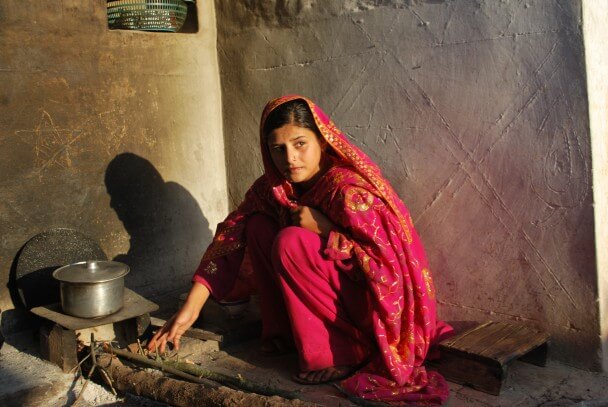
BAMcinemaFest (Brooklyn, NY)
June 17-28, 2015
A Woman Like Me (Alex Sichel & Elizabeth Giamatti)
A Woman Like Me is a hybrid documentary that interweaves the real story of Alex Sichel, diagnosed with terminal cancer in 2011, with the fictional story of Anna Seashell (played by Lili Taylor), who manages to find the glass half-full when faced with the same diagnosis. The documentary follows Alex as she uses film to explore what is foremost on her mind while confronting a terminal disease: parenting, marriage, faith, life, and death. Click here for showtimes.

Program Manager Iyabo Boyd shares some last-minute tips for our 2015 Accelerator Lab Open Call
The deadline for the 2015 Accelerator Lab Open Call is fast approaching. Applications are due this Wednesday, June 10, 2015, by 5:00 PM EDT.
If you’re only just getting started on your application, don’t worry – we’ve compiled the below tips to help you get up to speed fast:
Overview: For those of you that want a full breakdown of this whole process, please review our Grants page and Frequently Asked Questions, both of which provide very helpful and thorough information. If you still have questions, please email info@chickeneggpics.org with your project title in the subject line.
Funding and mentorship: This Open Call for funding is the process that determines which films will be selected for our 2015 Accelerator Lab. If you are selected to receive a grant, you will also participate in the lab, which is a year long intensive mentorship program (with possibility for extension). It is not a goal of the lab for the films to be completed in that year; that is the length of time you’ll spend with us receiving mentorship. The lab will be structured around 3 to 4 retreats that the granted directors are required to attend, with travel support from us. The lab will be more intensive and tailored than our past mentorship programs, but if you want some insight on our mentorship style in general, take a look at our mentorship page or our blog.
First- or second- time filmmakers: When we say first- or second- time filmmaker, we’re talking specifically about your experience as a director or co-director of feature-length documentaries. You are still eligible if you’ve already made a few shorts, or done fiction work, we’re looking for directors who are making their first or second feature-length documentary. By feature length, we mean 40 minutes or more. Read more about this in our Frequently Asked Questions.
Early production: For this round, we’re only accepting projects between development and early-production (with no more than 40% of the footage shot) because we want to ensure that we have the greatest opportunity possible to make an impact on the film and on your development as the director. If you’re having trouble figuring out what percentage you’ve shot, think about the big picture of your finished film, where you are now, and what you need to do to get to that finished project. What do you have in the can, and how much more shooting do you think you have left to do? That’s how you’ll assess if you’ve reached the 40%. We’re not keeping count, but we hope you’ll respect the guidelines and be honest with yourself when considering applying.
Work samples: In a nutshell, the short work sample should grab our attention and show the project’s potential; the long work sample should give us a deeper sense of your directorial style, characters, and pacing of the film; and the prior work sample should tell us about your experience and your ability to follow through. The short and long samples should consist of pieces of the project with which you’re currently applying, whereas the prior work sample is from a different film you’ve worked on in the past.
No footage shot yet: We have a strict requirement of at least 7 minutes of footage for applicants. If you can, shoot something quickly before the deadline or maybe ask your subjects to shoot some verite or interview of themselves for you, but only if you think it will be good enough to represent your project in our review process. We do not accept unsolicited updates, so the application is the only opportunity for you to show us what you have. If it doesn’t seem you can get it all together before the deadline, it might not be the right time for you to apply for this round.
Parting shots: Here are a few last items to keep in mind:
-
- For this round we are not accepting interactive projects or series. Stay tuned for announcements on an upcoming program geared toward these formats in 2016. Join our mailing list, and follow us on Facebook and Twitter.
- If you’re unsure what makes a documentary a hybrid, check out this great article from the POV blog. Please also note that just because your film is based on a true story, that doesn’t mean it’s automatically a hybrid.
- For guidance on the written application, be sure to look at the help text on the right side of each question. Please also note that the word count for many of the essay based questions is 2300 characters, including spaces. Trust us, brief is better.
If you have any additional questions or concerns, send an email to info@chickeneggpics.org. Be sure to include the name of your project in the subject line.
Acing Your Q&A
Filmmaker discussions and Q&As are a great way for you to connect with the people who care about your film, and audiences love the chance to engage with you and discuss your film.
Glenn Raucher, Director of Theater Operations at the Film Society of Lincoln Center has seen countless film talkbacks; below, he and his staff shared with us stories of Q&A pros who used every possible chance to connect with their audience.
“John Waters, upon hearing that we were turning away 100+ people (!) from a stand-by line (sure to be disappointed, at best), offered to go out and greet them all, giving them a great experience, despite being turned away. Pedro Almodovar did the same before his ridiculously sold-out Amphitheater Talk” – Glenn Raucher, Director of Theater Operations.
“In 2002 Gary Sherman brought in his own print of “Deathline,” (uncut and very different from the theatrically released 1974 version that was re-titled “Raw Meat”). As a result, the audience got to see a version of the movie that had rarely, if ever, been shown in the United States. He was also patient and cooperative with the staff and his fans.” -Fletch Cossa, House Manager
“During a screening of “Jauja” in the New York Film Festival, the subtitling for the film failed momentarily, causing us to have to pause the film. Viggo Mortensen stood up, and cheerfully talked with the crowd while they waited, also communicating that…s**t happens, and it’s all good! It diffused the tension until the computer issue was fixed and the film resumed.” -Glenn Raucher, Director of Theater Operations
“Sacha Baron Cohen, in character as Borat, offered a “Brazilian” to everyone taking an elevator backstage with him, including our house manager. He was also, out of character, unfailingly friendly and polite.” -Karim Allick, House Manager
“A woman approached me and asked if I could help her convince Jean Dujardin to record a brief message of uplift for her very sick husband, a friend of the Film Society’s. Dujardin had flown in that day, and was clearly exhausted, but after a brief explanation, he said “of course!” and recorded a charming and funny get-well message.”- Glenn Raucher, Director of Theater Operations
These stories remind us that you don’t have to be a celebrity to make a great impression on your audience. House Manager Patrick Ng shares 3 overall tips to keep in mind for your Q&A:
- Keep your answers brief, unless you have an awesome anecdote to tell. This allows for more questions to be taken from the audience, and keeps the momentum moving. First time filmmakers tend to be more long winded in their responses, while the pros take the “less is more” approach. Short answers also provide the best quotes used in press and social media.
- Share your insight. People will remember your Q&A more when they can walk away with a nugget of insight that will inspire them, motivate them, make them look at something in a different way.
- Schedule permitting, make yourself available after the Q&A (in the lobby, not the theater!) to take more questions. A lot of people don’t feel comfortable asking a question in front of a full house and would prefer a more intimate circumstance.
Mentorship Selects: How to follow up
Programmers and executives from HBO, Candescent Films, POV, and IFP shared their favorite ways filmmakers follow up:
Re-introduce yourself and your project.
Send a short email with where we met and a one page sheet with all the info about your film.
If you send a link, make sure it’s downloadable and easily accessible.
If it can’t be downloaded for security reasons, explain and ask how many DVDs you should send. Make sure your link has a very easy password so people don’t get frustrated opening it.
Know when to give them some space.
Send another quick email if you don’t hear back but back away after 3 follow-up emails.
Be nice.
If you see the programmer or executive, be friendly. Don’t tell them they didn’t respond or remember you. If they can’t help you personally, they still can be a friend to the project by connecting you with other people who can help you, so keep the lines of communication open and courteous.
Mentorship Selects: How to give confident and compelling interviews
Many filmmakers prefer working behind the camera, not in front of it, but talking about your film on TV, radio, and on panels provides enormous exposure for your film and the issues it tackles. Filmmaker Jessica Devaney and publicist Adam Segal of The 2050 Group joined our New York mentorship to shed some light on media presentations and dispel some common fears around media interviews.
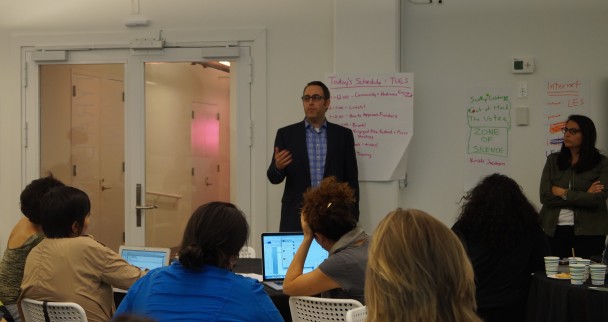
Here are their tips for giving your best media interviews:
Tell the story you want to tell.
Remember: as a filmmaker you are a storyteller, not a pundit. In media scenarios you are in charge of the story you present and you can direct the conversation toward what you want people to know about your film. Don’t just answer the questions. Ask yourself: what sentence do I need to say for this to be successful? Make sure you don’t get up till you say that sentence.
Be accessible.
Avoid jargon or overly technical vocabulary; don’t alienate your audience with big words or phrases they might not understand. Neutralize distracting physical tics like touching your hair or fiddling with jewelry.
Do your homework.
Talk to the producer and find out what they’re going to ask you. Look up when they last interviewed someone like you or talked with someone on your topic (via tracie). Observe what kinds of questions they asked or what angle they took.
Keep a cool head.
If you are a person who gets worked up, practice talking about hot button issues without losing your cool. If you make a mistake or say some wrong information, correct it before someone else does.
There’s strength in numbers.
If you want to take the focus off yourself, bring one of your subjects in the film with you.
Make sure your assets and materials are versatile.
Put together clips and assets that can be reused in different settings or shared in a different context.
Mentorship Selects: 7 tips for pitching your film
With the help and guidance of our guest experts and industry friends, we’ve put together this list of our 7 tips to keep in mind when you are pitching your film or project.
Practice, practice, practice.
Pitching is like a performance. If you’re prepared, you will feel and appear more relaxed.
Don’t repeat everything that is in your trailer.
Use every opportunity to share new information about your project.
Accept the feedback and any criticism you get.
Don’t waste time trying to argue; say thank you and hold back defensiveness.
Match your presentation to the tone of your film.
If it is a serious topic, reflect that in your voice. If it if it is light match that.
Let the images speak for themselves.
Explain the compelling story, not the style. It’s hard to explain style and tone.
Do your research.
Know who you are speaking with and familiarize yourself with their interests and passion issues. Take notes so that when they follow up with you, you can show growth.
Know the landscape.
If you pitch something that sounds like something a distributer has already done, immediately distinguish it. Be humble; don’t say “my film is better;” say that your film “builds on these others because…”

